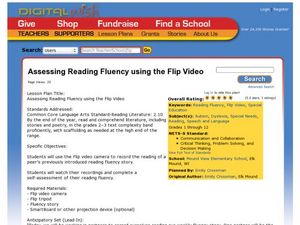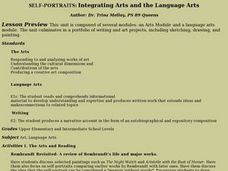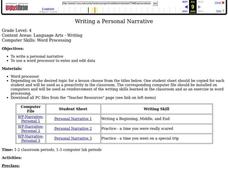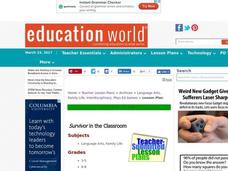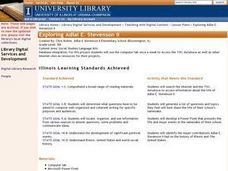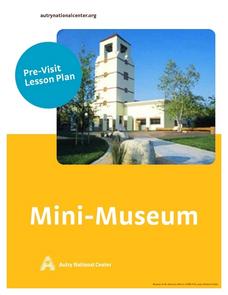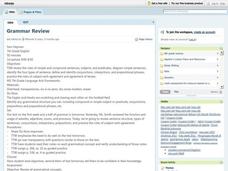Curated OER
Class Books
Students brainstorm a list of personal information based on a variety of categories. After writing positive comments on their classmates, they spilt into two groups with one entering the information into a database and the other...
Curated OER
Acrostic Book Report
Learners read the story Wild Horse Winter and construct acrostic poems. In this poetry lesson, students use adjectives and events in the text to develop an acrostic poem.
Scholastic
Descriptive Writing Fortunes
What does your fortune say? Engage class members in writing complete sentences by first handing out fortune cookies and reading the messages. Pupils will practice writing complete sentences by composing fortunes to put in die cut fortune...
Curated OER
Magical Creatures Land
The opening of J.R.R. Tolkein’s The Hobbit provides a model of how to use rich details to create a setting. After reading the description of Bilbo Baggins’ abode, young writers create their own magical home for a fantasy creature. The...
Curated OER
Assessing Reading Fluency Using the Flip Video
Utilizing a video camera, learners will read a story while being recorded. Later, they analyze the footage. After identifying their strengths and weaknesses with the teacher, they discuss reading fluency techniques. Adaptation: Instead...
Curated OER
Asking Research Questions
Using discoveries and inventions as the focus, learners complete a research project. First, they come up with research questions. Then, they conduct research on the topic. Finally, they write a research paper.
Curated OER
Self-portraits: Integrating Arts And the Language Arts
Students look into a mirror and draw their own self-portraits. Then they write a descriptive essay, describing the portrait and the features of their face.
Curated OER
Writing a Personal Narrative
Students complete a variety of computer file pre-writing activities to help them prepare for writing a personal narrative. They focus on including a beginning, middle and end to their narrative. They make a class book.
Curated OER
Survivor In The Classroom
Students engage in a lesson which adapts the idea behind Survivor to an outside-of-class project. How many students would survive? students take responsibility for meeting deadlines while strengthening their writing and communication...
Curated OER
Exploring Adlai E. Stevenson II
Fifth graders research work to research six areas in the life of Adlai E. Stevenson II: His Early life, Governor of Illinois, Campaigns for president, Ambassador to the UN, famous quotes, later years. They create a supply of notecards...
Curated OER
Mini Museum
Students brainstorm about the different types of museums and complete a worksheet by looking at artifacts and what they think that object did. They work together in groups to complete a KWL chart throughout the lesson.
Curated OER
Increasing Multicultural Understanding Through Folk Literature
Students read folktales from around the world comparing two of them using a computer generated Venn diagram. They create a game based on a folktale and use software to create a listening library of folktales.
Curated OER
"Planet" Vacation
Young scholars research a location of their choice using the internet. They list the characteristics of the location and why they chose it as their ideal vacation spot. Using maps, they pinpoint their destination and trace their route....
Curated OER
What I Did On My Summer Vacation
Students use the internet to research the location of their summer vacation trip. Given the demographics, they plot the location on a world map. They create a brochure using the information they collected. Using PowerPoint, they develop...
Curated OER
Book Buffet
Students are encouraged to develop a love for reading by sampling different types of literature. They are encouraged to read one of the books that is sampled. The sample should be challenging for the reader without causing discouragement.
Curated OER
Grammar Review
Review grammar rules for simple and compound sentences. Learners diagram sentences and identify conjunctions, interjections, and prepositional phrases. As a class, they study their notes and complete pages in their grammar book to...
Curated OER
Finding Main Ideas
Elementary schoolers read paragraphs one at a time in order to pick out the main ideas. They choose which sentences are most important in a paragraph. This type of exercise prepares learners to identify the main idea in longer narratives.
Curated OER
Dictionary Detective
Build your class's dictionary skills with this fun game. The activity allows learners to better understand dictionary usage, spelling, and vocabulary. By the end of this activity, they should be skilled word finders.
Curated OER
Recycled Greeting Cards
Students create greeting cards from recycled products. They research how paper is recyled and the history of paper. They write free verse and create their own recycled paper. They use Microsoft Word to write their final drafts of verse...
Curated OER
Survival Experts
Students take on the role of survival experts as they research and produce brochures or guides to educate others about what to do in the event of a natural disaster.
Curated OER
What is Your Story?
Young scholars listen to Picnic In October and Memory Coat to explore the concept of memoirs. They interview a family member and write a personal memoir that reflects their own family history.
Curated OER
Children's Books Teach Diversity, Respect
Students compare aspects of children's books that teach diversity and respect. They examine universal values such as courage and bravery, respect and apathy. They create a final project based on their ability to recognize the values in...
Curated OER
Clicking Your Way to Poetry: Composing Word Association Poems with the Visual Thesaurus
Use a Visual Thesaurus to compose word association poems. Discuss poetry and word association, create word maps, then practice creating poems based on playful word associations. A perfect way to celebrate "Poem in Your Pocket Day" (April...
Curated OER
Retelling Information
This scripted lesson suggests using the journalist’s five W’s (who, what, when, where, why) to teach readers how to summarize a story and to how to distinguish between significant and supporting details. A template and rubric are...






